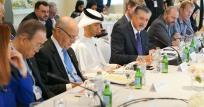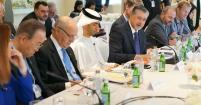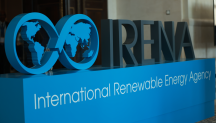

World Government Summit Calls for Urgent Energy Transformation and Climate Action
Newsletter
World leaders currently meeting at the World Government Summit in Dubai called for greater ambition and action to fight climate change. The call was sent from the Climate Change Forum which brings together decision makers, international organisations, senior government officials and businesses from across the world to assess the human and environmental impacts of climate change, identify creative solutions to combat it, and discuss ways of ensuring compliance with the Paris Agreement and the 2030 Agenda for Sustainable Development. IRENA Director-General Adnan Z. Amin played an integral role in the Climate Change Forum strongly emphasising the crucial role of renewable energy as cost-effective and economically attractive climate solution.
During a roundtable convened by UAE’s Ministry of Climate Change and Environment and hosted by Minister Dr. Thani Al Zeyoudi, Director-General Amin joined the call for a dramatic scaling-up of action to address the urgent challenges that the world is facing. He stressed that the impacts of climate change compound existing risks and pressures such as population growth, urbanization, environmental degradation, and rising socio-economic inequalities. Climate change also adversely impacts livelihoods of people by increasing food insecurity, water and land scarcity and unemployment. These consequences in turn lead to increased vulnerability amongst the affected population.
The panel, whose participants included Gina McCarthy, Head of the Harvard T.H. Chan School of Public Health, Ban Ki-Moon, Eighth Secretary-General of the United Nations and President of Global Green Growth Institute, Laurent Fabius, President of the Constitutional Council in France, María Fernanda Espinosa, President of the UN General Assembly, Luis de Alba, UNSG Special Envoy for 2019 Climate Summit, and others, recognised the important work of IRENA in identifying renewable energy solutions that cut across many areas of human development.
IRENA’s analysis shows that accelerating the energy transition in line with the Paris Agreement would significantly outweigh the increase in energy system costs. One of the most important social welfare benefit of the energy transition is the reduction in harm to health from air pollution. The WHO estimates that seven million people die every year from air pollution. Accelerating renewables deployment in line with the Paris Agreement can bring down negative health effects associated with air pollution by 62% by 2050.
Gains in human health (a fundamental driver of energy policy in many countries) and lower CO2 emissions from fossil fuels would generate savings (on average) of USD six trillion annually by 2050, an amount that is over three times larger than the additional cost of decarbonisation. If the higher end estimate is used, then cost savings would be as much as five times larger than the additional cost of decarbonization
An estimated one billion people globally are served by health care facilities without reliable electricity supply today. Surveys carried out in 14 countries have revealed that only 28% of all healthcare facilities in those countries have fully reliable access to electricity. Off-grid renewable energy solutions are a key opportunity to dramatically improve the quality of health services in energy poor areas.
Following the panel discussion, the Director-General met bilaterally with Mr. Ki-Moon, Mr. Fabius and others to discuss how to frame calls for an acceleration of the energy transition to achieve maximum impact, and to explore opportunities to further strengthen partnerships.




